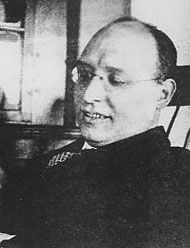
"It is childish to assume that science began in Greece...." –- George Sarton, professor, History of Science (Harvard University), Ancient Science Through the Golden Age of Greece, April 18th 1951
Greatest zinger ever?
Thus Harvard professor George Sarton considered all Darwinists, especially Carl Sagan and Isaac Asimov, to be immature thinkers and mere children.
"It is childish to assume that science began in Greece; the Greek ‘miracle’ was prepared by millennia of work in Egypt, Mesopotamia and possibly in other regions. Greek science was less an invention than a revival." -- George Sarton, professor, History of Science (Harvard University), Ancient Science Through the Golden Age of Greece, April 18th 1951
"Some of the conclusions reached by Eudoxos and Aristotle are still essential parts of the knowledge current today." -- George Sarton, professor, History of Science (Harvard University), Ancient Science Through the Golden Age of Greece, April 18th 1951
"We well know that whatever amount of civilization we enjoy today is the gift of many nations; we do not know so well that the same was already true thousands of years ago. Prehistorians have proven beyond doubt the existence of sophisticated cultures at very early times in many places." -- George Sarton, professor, History of Science (Harvard University), Ancient Science Through the Golden Age of Greece, April 18th 1951
"Some people are more advanced than others, nor do they all pass through the same stages. The passage from nomadic to settled life occurred many millennia ago in some places, yet it has not been completed today by the Arab Bedouins." -- George Sarton, professor, Historian of Science (Harvard University), Ancient Science Through the Golden Age of Greece, April 18th 1951
"No savages have ever been found near water who were not able to navigate it...." -- George Sarton, professor, History of Science (Harvard University), Ancient Science Through the Golden Age of Greece, April 18th 1951
"According to the Norwegian archaeologist Anton Wilhelm Brogger, there was a golden age of oceanic navigation during the period roughly defined as 3000 to 1500 B.C., that is, before the days of Phoenecian navigation." -- George Sarton, professor, History of Science (Harvard University), Ancient Science Through the Golden Age of Greece, April 18th 1951
"We have already referred to the prehistoric knowledge of herbs and other drugs, knowledge distilled from immemorial empiricism, trial and error doggedly continued for hundreds and thousands of years. It is impossible for us to understand how such vague and casual experiments could be repeated long enough, their results taken note of and transmited from generation to generation, but the fact is there: our prehistoric ancestors, like the primitive people who can still be observed, had managed to try many plants and other objects and to classify them in various groups according to their utility or danger."
"We have already spoken of the stars. It was impossible for any reflective man to observe them night after night without asking himself a number of questions, which were primarily scientific questions."
"It is not necessary to emphasize the antiquity of Egyptian medicine...."
"The people [Darwinists] who speak of Hippocrates as the father of medicine should bear in mind that Hippocrates comes about half way between Imhotep and us. That would improve their perspective of ancient science."
"... will the scientists of the year 5000 think as favorably of our methods as we do ourselves?"
"Some readers having at the back of their minds the prejudice that science is a Greek invention (have not scholars repeated that for centuries?) will insist and say, 'That may be science, but not pure science.' Why not? At the end of his admirable investigation of the Smith papyrus, Breasted concluded: Indeed these two men, the surgeon who was the original author of the treatise, and his later successor, who wrote the glosses forming the ancient commentary, both living in the first half of the third thousand years B.C., were the earliest known natural scientists. In the long course of human development they are the first men whom we can see confronting a great body of observable phenomena, which they collected and stated, sometimes out of interest in scientific truth, as inductive conclusions which they drew from observed fact."
"Let us repeat once more that the whole Greek science (as opposed to Hellenestic and Roman science) was developed in a period of time that was not only preceded but followed by Mesopotamian (and Egyptian) activities. If we replaced time by space, we might visualize Greek science as a small island surrounded by an Oriental sea."
"'Babylonian' science is prior to the first millenium, that is, it is completely prior to Greek 'historic' times, prior to Homer and Hesiod, not to mention the Ionian philosophers."














1 comment:
Danaos admit to arriving in Hellas, but they do not say they were Dan. The Romans appear to say that, in reference to that Troy misunderstanding. Troy would have been Dan too? They were on the coast north of known Dan territory, into the Bekaa Valley in modern Syria.
Trojan and Etruscan influences and Greek of course, provided us with the curse/blessing of Rome.
Post a Comment